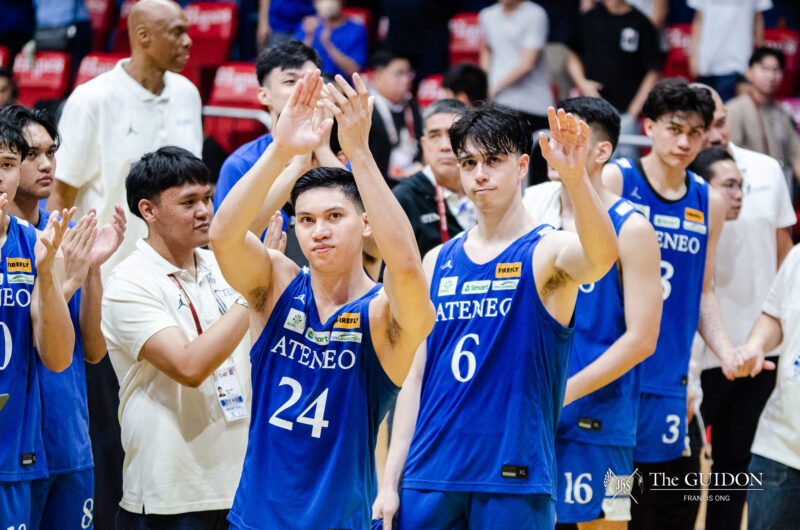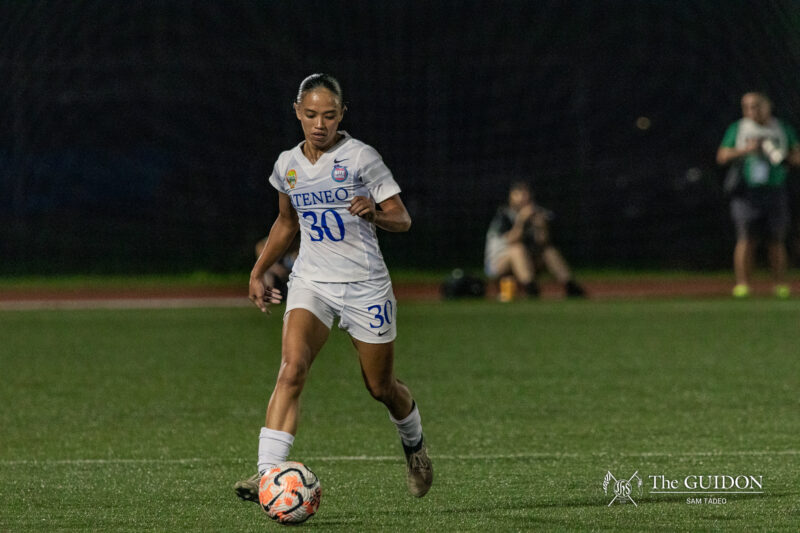Benjo Beringuela, a freshman, voted twice during the Sanggunian elections. Beringuela was one of the students the Ateneo Commission on Elections (Comelec) asked to vote again after discovering numerous misprints in the official ballots.
“Huwag na sana nila maulit, kasi sobrang hassle sa mga bumoto. Dahil du’n, tatamarin lang kaming bumoto ulit (I hope it doesn’t happen again, because it’s such a hassle to voters. The student body will just feel hard-pressed to vote again).”
He adds, “I guess they [Comelec] were doing their best when it comes to spreading [the word about the elections, but when it came to the actual] execution during the election days, medyo sabog (it was rather disorderly).”
Filing controversies
One particularly taxing ordeal for some of the candidates (and, by extension, the IBIG-Agila party leadership), was this case that came up on January 30.
It was early that day when The GUIDON first noticed the exclusion of six expected freshmen candidates—AJ Elicaño, Gavin Chan, Monica Esquivel, Mikey Eleazar, Raiza Osi, and Third Fernandez—from the official list of candidates released by the Comelec just a few hours before.
Elicaño was the first to respond among these candidates when sought for comment about the situation, which he first learned from The GUIDON. Elicaño, then running for the position of the School of Humanities Freshmen Central Board Representative, did not know what was happening at first.
Upon upon further clarification with the Comelec, The GUIDON got to confirm the following facts: Fernandez didn’t make it to the deadline for the filing of candidacies, leading to his disqualification; Eleazar and Chan’s candidacies weren’t initially approved because of some technical oversights on the part of Comelec concerning email attachments; and, finally, Elicaño, Esquivel, and Osi failed to email Comelec soft copies of their requirements, which was reason for disqualification.
There was no question about Fernandez’s disqualification, but a lot of questions were raised about the initial disqualification of the other five.
According to Comelec Chief Commissioner Jessica Lazaro, Eleazar and Chan’s names were eventually added to the list of candidates when it was discovered that Eleazar and Chan had submitted the soft copies of their requirements, although through a proxy (another candidate, Maan delos Santos) in the case of Chan.
At that point, Chan and Eleazar were running unopposed, under the coalition Ateneo Student Leaders (ASL). Such a situation led IBIG-Agila to take action.
Alex Ang, former Executive Director of IBIG-Agila, contacted Comelec through email (copy furnished to The GUIDON) to seek clarification about the “validity and legitimacy of this new list of candidates which includes [Chan],” mainly on the grounds that the Electoral Code prohibits Delos Santos, who is running for a Top 4 position, from helping other candidates.
Ang’s email argued on the technicality that Delos Santos helped Chan by agreeing to send the soft copies of his requirements for him using her own email, and that such help from a supposedly independent Top 4 candidate to a member of a coalition constituted a violation of the electoral code.
The Comelec shot down Ang’s arguments by ruling that coalitions did not even exist yet at the time of Delos Santos’ proxying for Chan, because coalitions can only be formed after the release of the official list of candidates.
IBIG-Agila then decided to take another step, and approached the Student Judicial Court (SJC) to appeal for the inclusion of Osi, Elicaño, and Esquivel in the list of candidates.
Elicaño said it wasn’t made clear, at that time, that candidates were required to submit soft copies. Pressed for comment back then, he emailed: “Only going to say that the party will be presenting a case for appeal regarding the situation tomorrow. Beyond that, my virtual lips are sealed… [I] wish I could be of more help, but given how messy this all is right now, probably best not to add further fuel to the fire.”
In the end, though, the Comelec just decided to let the three IBIG-Agila candidates run, citing miscommunication. This rendered IBIG-Agila’s appeal to the SJC moot. This ruling by Comelec lent some resolution to the heated partisan politics that the confusion seems to have unleashed.
Misinterpretations
Some candidates have also raised concerns about the “ambiguity” of some rules the Comelec enforced for the elections through the Electoral Code.
Howie Uyking, then candidate for president, and Quico Muñoz, then candidate for vice president, both lamented the sanctions the Comelec imposed on them after it was ruled that their respective online campaign paraphernalia in Facebook weren’t approved first by the commission.
The two argued that nowhere in the rulebook was it declared that creating Facebook fan pages was subject to Comelec approval.
Comelec, however, was still able to give a ruling that sufficiently explained the reason behind the sanctions. Nevertheless, Lazaro admitted that there are loopholes in the Electoral Code. “We’re working on it…and there is a provision that says that it is open to interpretation by Comelec,” she said.
Attempts at promotion
Another aspect of Comelec’s work that has received some criticism is the promotion of the elections. Lance Viado, one of the only two candidates running for a Top 44 position who failed to meet quota, believes the Comelec could have done a lot more with regard to this.
He believes the Comelec didn’t maximize the resources available to it in order to reach a greater audience. He cites, for example, the seeming disregard for the school’s PA (public address) system as a useful tool for the promotion of the elections.
Lazaro says that Comelec planned to make use of the PA system, but their proposal was rejected because they did not follow the standard operating procedures of the school.
Viado also mentioned that the wallpaper ads in the Rizal Library computers were set up late by the Comelec. The wallpaper ads were, in fact, set up only after the elections.
Consistencies
A lot of other mishaps hit the Comelec during the two election days, apart from the misprinted ballots. Viado, for example, explains how the Comelec repeatedly promoted the new Rizal Library as a voting venue.
When the election days came, however, there was no such voting station in the building. Lazaro blames it on miscommunication with the library.
Lazaro says, “If [the people who went to the new Rizal Library] really wanted to vote, they would have gone somewhere else [to vote].”
Elicaño also raises concern over the list of block representative candidates during the election days. According to him, the list was inaccurate, and there were actually so many cases wherein voters were not given the list.
Elicaño also criticizes the arrangement of the names of the candidates, because they were classified by course. This is problematic because some blocks are composed of students from multiple courses.
That many of voters were, according to Elicaño, not even aware that they were supposed to write down the name of their block rep candidate of choice in the ballot also led to a lot of confusion. He added that this may be a factor behind numerous failures in block representative elections.
After news of the misprinted ballots during the first Election Day came up, former Sanggu President Gio Tingson said he expected more from the Comelec. “Such inconsistencies bring about the question of their reliability especially with the counting of votes. They were strict with the candidates, with regards to deadlines but they weren’t that strict in ensuring the ballots [were correct],” he said.
Elicaño agrees. “[It] just felt a little weird. They were being very strict, tapos (then) they messed up. It feels really inconsistent.”
The defense
Despite all the negative press and criticism that has been thrown at Comelec lately, Lazaro remains adamant that the commission has been pretty successful in the elections. She also points out that it is not Comelec’s job to promote the elections.
“I believe Comelec’s job is to facilitate,” says Lazaro, “hindi [namin trabahong] habulin ang quota (it’s not our job to ensure that the quota’s met).”
She says that the SJC has told Comelec about this. Lazaro adds that Comelec’s job ends with making people aware of the elections (including the dates, voting stations, candidates, etc.), but it does not actually include making sure that the quota is met.
“It’s the candidate’s job to reach quota,” she says.
Lazaro also wanted to clarify the common misconception that Comelec had difficulty meeting quota,
According to Lazaro, the quota was actually reached at 3 pm of the second election day. Everyone, even Comelec, just thought that they still had not reached quota at that point because the senior population was mistakenly included in the calculation for the required quota. The Sanggu Constitution states that senior votes are to be considered as non-quota votes.
Lazaro says that accusations that Comelec is incompetent are false. When the ballots were misprinted, she says, the person in charge got sick two weeks before the elections, and was new to the job and still had to adjust.
Lazaro says that the incident can be considered an oversight, but never a “sign of incompetence.”
According to Lazaro, many of the other things that Comelec did this year are quite good. She says for example that the Miting de Avance this year was a big improvement from last year’s. She says a bigger crowd attended this year because the event was better advertised, and the venue itself (SEC Field vs. last year’s Escaler Hall) was more visible and appropriate for the event. She also cited that this year, the Miting de Avance had hosts and a greater number of panelists.
Curtailed voice
Comelec is aware of the many criticisms and comments raised about them. In the eyes of many, however, this is but a proportionate response to their booboos.
Consider, for example, the case of Ian Agatep. As a freshman candidate for the position of SOM Central Board Representative, he previously commented on the three-hour delay caused by the misprinted ballots: “I leave my trust to the Comelec, although I was just thinking how many people could have voted during that span of time.”
Little did he know that he would only lose by 11 votes to his nearest competitor.
With reports from Joan C. Medalla, Klarisse P. Felix, Lourdes M. Jimenez, and Bea C. Cupin







[…] error with the names mirrors the mistakes in last year’s Sanggunian General Elections, in which the official ballots were also lacking the names of some candidates during election […]